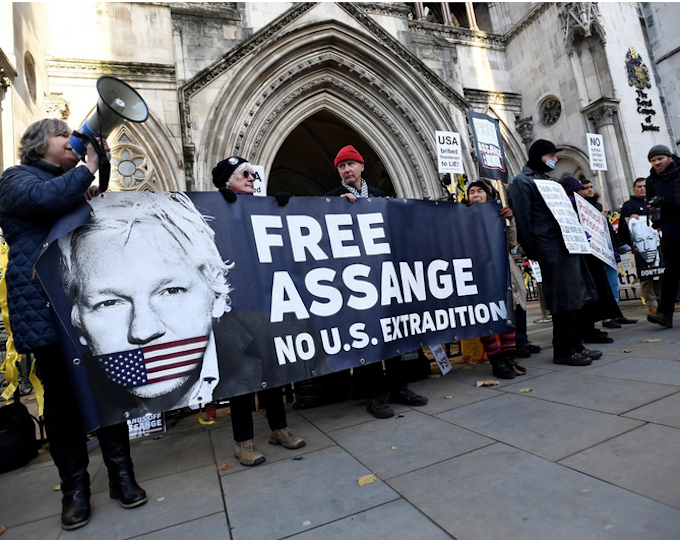
ANALYSIS: By Brett Wilkins
As Julian Assange awaits the final appeal of his looming extradition to the United States while languishing behind bars in London’s notorious Belmarsh Prison, leading left luminaries and free press advocates gathered in Washington, DC, on Friday for the fourth sitting of the Belmarsh Tribunal, where they called on US President Joe Biden to drop all charges against the WikiLeaks publisher.
“From Ankara to Manila to Budapest to right here in the United States, state actors are cracking down on journalists, their sources, and their publishers in a globally coordinated campaign to disrupt the public’s access to information,” co-chair and Democracy Now! host Amy Goodman said during her opening remarks at the National Press Club.
“The Belmarsh Tribunal… pursues justice for journalists who are imprisoned or persecuted [and] publishers and whistleblowers who dare to reveal the crimes of our governments,” she said.
“Assange’s case is the first time in history that a publisher has been indicted under the Espionage Act,” Goodman added.
“Recently, it was revealed that the CIA had been spying illegally on Julian, his lawyers, and some members of this very tribunal. The CIA even plotted his assassination at the Ecuadorean Embassy under [former US President Donald] Trump.”
Assange — who suffers from physical and mental health problems, including heart and respiratory issues — could be imprisoned for 175 years if fully convicted of Espionage Act violations.
Among the classified materials published by WikiLeaks — many provided by whistleblower Chelsea Manning — are the infamous “Collateral Murder” video showing a US Army helicopter crew killing a group of Iraqi civilians, the Afghan War Diary, and the Iraq War Logs, which revealed American and allied war crimes.
Arbitrary detention
According to the United Nations Working Group on Arbitrary Detention, Assange has been arbitrarily deprived of his freedom since he was arrested on December 7, 2010. Since then he has been held under house arrest, confined for seven years in the Ecuadorean Embassy in London while he was protected by the administration of former Ecuadorean President Rafael Correa, and jailed in Belmarsh Prison, for which the tribunal is named.
Human rights, journalism, peace, and other groups have condemned Assange’s impending extradition and the US government’s targeting of an Australian journalist who exposed American war crimes.
“That the extradition proceedings against Assange are an unexpected legal outcome — is a lie. Based on my experience as Ecuador’s foreign minister…the British government wanted to extradite him all along.” — @GuillaumeLong
Attend the Belmarsh Tribunal. https://t.co/1au3neo8FD pic.twitter.com/hwshaiiQzM
— Progressive International (@ProgIntl) January 19, 2023
In a statement ahead of Friday’s tribunal, co-chair and Croatian philosopher Srećko Horvat said:
The First Amendment, freedom of the press, and the life of Julian Assange are at stake. That’s why the Belmarsh Tribunal is landing literally just two blocks away from the White House.
As long as the Biden administration continues to deploy tools like the Espionage Act to imprison those who dare to expose war crimes, no publisher and no journalist will be safe.
Our tribunal is gathering courageous voices of dissent to demand justice for those crimes and to demand President Biden to drop the charges against Assange immediately.
Belmarsh Tribunal participants include Pentagon Papers whistleblower Daniel Ellsberg, US academic Noam Chomsky, British parliamentarian Jeremy Corbyn, former Assange lawyer Renata Ávila, human rights attorney Steven Donziger, and WikiLeaks editor-in-chief Kristinn Hrafnsson.
The Belmarsh Tribunal hearing in Washington DC on January 20, 2023. Video: Democracy Now!
Assange’s father, John Shipton, and the whistleblower’s wife and lawyer Stella Assange, are also members, as are Shadowproof editor Kevin Gosztola, Chip Gibbons of Defending Rights, Selay Ghaffar of the Solidarity Party of Afghanistan, investigative journalist Stefania Maurizi, The Nation publisher Katrina vanden Heuvel, and ACLU attorney Ben Wizner.
Former U.K. Labour Party leader @jeremycorbyn is in Washington for the Belmarsh Tribunal to advocate for Julian Assange’s freedom as he fights extradition from Britain to the United States.
“We’re standing up for the right to know. We’re standing up for journalism,” Corbyn says. pic.twitter.com/A4v6QbNSN0
— Democracy Now! (@democracynow) January 20, 2023
First Amendment foundation
“One of the foundation stones of our form of government here in the United States . . . is our First Amendment to the Constitution,” Ellsberg — whom the Richard Nixon administration tried to jail for up to 115 years under the Espionage Act, but due to government misconduct was never imprisoned — said in a recorded message played at the tribunal.
“Up until Assange’s indictment, the act had never been used… against a journalist like Assange,” Ellsberg added. “If you’re going to use the act against a journalist in a blatant violation of the First Amendment… the First Amendment is essentially gone.”
Ávila said before Thursday’s event that “the Espionage Act is one of the most dangerous pieces of legislation in the world: an existential threat against international investigative journalism.”
“If applied, it will deprive us of one of our must powerful tools towards de-escalation of conflicts, diplomacy, and peace,” she added.
“The Belmarsh Tribunal convened in Washington to present evidence of this chilling threat, and to unite lawmakers next door to dismantle the legal architecture that undermines the basic right of all peoples to know what their governments do in their name.”
The Belmarsh Tribunal, first convened in London in 2021, is inspired by the Russell Tribunal, a 1966 event organised by philosophers Bertrand Russell and Jean-Paul Sartre to hold the US accountable for its escalating war crimes in Vietnam.
Brett Wilkins is a staff writer for Common Dreams. Republished under a Creative Commons licence.














































